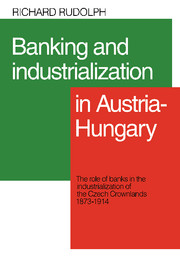 Banking and Industrialization in Austria-Hungary
Banking and Industrialization in Austria-Hungary Book contents
- Frontmatter
- Contents
- List of tables and charts
- Preface
- Abbreviations
- Introduction
- 1 Industrial development in the Austro-Hungarian Monarchy 1873–1914
- 2 Industrialization in the Czech Lands
- 3 Evolution of the financial structure
- 4 The relationship of banks to industry: the Viennese Great Banks
- 5 The relationship of banks to industry: the Czech banks
- 6 Sources of industrial credit
- 7 The role of the banks
- Appendixes
- Notes
- Select bibliography
- Index
3 - Evolution of the financial structure
Published online by Cambridge University Press: 05 January 2012
- Frontmatter
- Contents
- List of tables and charts
- Preface
- Abbreviations
- Introduction
- 1 Industrial development in the Austro-Hungarian Monarchy 1873–1914
- 2 Industrialization in the Czech Lands
- 3 Evolution of the financial structure
- 4 The relationship of banks to industry: the Viennese Great Banks
- 5 The relationship of banks to industry: the Czech banks
- 6 Sources of industrial credit
- 7 The role of the banks
- Appendixes
- Notes
- Select bibliography
- Index
Summary
There can be no doubt that the financial intermediaries of Austria-Hungary were closely connected with industrial enterprises and the process of industrialization. As some contemporaries pointed out, the relationship between banks and industry was at times more intimate than that existing in Germany. Nevertheless, the view that the banks acted as promoters of industrialization at a certain stage of “relative backwardness,” or that they emulated the German universal banks, must be qualified to a very great degree. In certain very significant particulars, the bank–industry relationship differed a great deal from that in the German Empire; even more important, the relationship between banks and the industrial sector was not a stable one and changed throughout the period under discussion.
In the following sections, an attempt will be made to distinguish some of the major features of the financial system in its relationship to industrialization in the Czech Lands, particularly with a view to the degree to which the banks did or did not facilitate growth. Theoretically, the financial structure is in a position to facilitate economic growth through its role as a financial intermediary, interposing itself between and thereby separating the functions of savings and investment. The facilitating or accelerating role of financial institutions in industrialization would not exist if the following conditions held: (1) If all investors had the same ability to combine factors of production, to utilize assets at their disposal, and had the same view toward risk; (2) if there were no economies of scale within production units or externalities within an economy; and (3) if investments were not indivisible, i.e., if some production units did not require investments beyond the capabilities of their own ability to save.
- Type
- Chapter
- Information
- Banking and Industrialization in Austria-HungaryThe Role of Banks in the Industrialization of the Czech Crownlands, 1873–1914, pp. 66 - 90Publisher: Cambridge University PressPrint publication year: 1976


